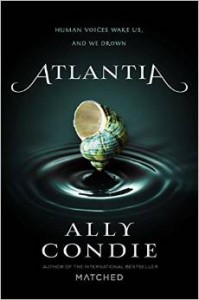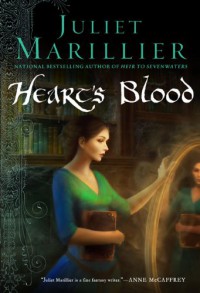Untitled
 I read a sample of Ally Condie's ATLANTIA back in June, and since then I had anticipated the release of the novel. When it was finally available at the local library, I requested it and checked it out immediately. It took me about a couple days to read it, a couple more to let my mind digest it...and probably one more day to reflect on what I just read. During that time, I kept shifting from it was good to disappointing. While the novel wasn't entirely what I had expected, it wasn't a complete disaster (pun not intended). And maybe I should have expected to feel underwhelmed by the novel overall, since I have tried and set aside MATCHED years ago. Like MATCHED, ATLANTIA is anti-climatic. The narrative is smooth, the descriptions beautiful, but the action is stunted. Rio's voice resonates with me, but the spark that brings out the emotional impact seems to be missing. Also, I wasn't personally satisfied with ATLANTIA being a standalone. A concept/premise such as this could work as a standalone novel (Sheryl Jordan's WINTER OF FIRE comes to mind). And yet I couldn't help but feel like a huge chunk is missing in ATLANTIA. There seems to be room for world building and conflict for possible sequels/companion novels.
I read a sample of Ally Condie's ATLANTIA back in June, and since then I had anticipated the release of the novel. When it was finally available at the local library, I requested it and checked it out immediately. It took me about a couple days to read it, a couple more to let my mind digest it...and probably one more day to reflect on what I just read. During that time, I kept shifting from it was good to disappointing. While the novel wasn't entirely what I had expected, it wasn't a complete disaster (pun not intended). And maybe I should have expected to feel underwhelmed by the novel overall, since I have tried and set aside MATCHED years ago. Like MATCHED, ATLANTIA is anti-climatic. The narrative is smooth, the descriptions beautiful, but the action is stunted. Rio's voice resonates with me, but the spark that brings out the emotional impact seems to be missing. Also, I wasn't personally satisfied with ATLANTIA being a standalone. A concept/premise such as this could work as a standalone novel (Sheryl Jordan's WINTER OF FIRE comes to mind). And yet I couldn't help but feel like a huge chunk is missing in ATLANTIA. There seems to be room for world building and conflict for possible sequels/companion novels.ATLANTIA is a quiet novel driven by the character's motivations, which I admired. Rio, the protagonist, didn't become the driving force for the external conflict until near the last few chapters. However, that's not to say she was a passive character. I personally thought the novel did well with how it handled Rio's situation and how she responded to it. After reading the chapter, I would ponder over what would happen next, if Rio would find a way to go to Above, and how she would execute her plans. Of course, what I ended up reading didn't match up with my imagination. Not a bad thing, more of a pleasant surprise. Rio couldn't just find a way to leave Atlantia (or Below) and travel to the surface world to confront her sister. Even the novel showed how difficult it would be, especially if you don't want to get caught. Rio had to work for it, learning how to swim, and earning money. From my reading experience with similar stories, some protagonists would have it easily handed to them on a silver platter. So to read a character struggling with their goals and or reflecting on their mistakes is not only realistic for me but refreshing as well.
The pacing is slow, but, as a reader, I understand the reasoning behind it. Where some readers prefer a faster approach in getting the protagonist to move from point A to point B, I thought the novel exceeded in spacing out key events. From Rio's point of view, one cannot escape from an underwater city and arrive on the surface in a short time frame. Although I can easily relate to Rio's internal conflict, the external conflict mostly serves as a back drop for the story. The tension between Above and Below is explained - through dialogue in some cases - from time to time. As this is a standalone novel, only so much could be packed into it in order for readers to receive an understanding of the setting(s). Speaking of world building, I was disappointed with the incompleteness of the settings, specifically Above. Rio visits Above, during the last several chapters of the novel, for a brief period of time. I only know little afterward. There were details and imagery, but it wasn't enough for me to not just imagine the world, but to feel it as well. And how does Above contrast with Below? Sure there were details/explanations, but it unfortunately came off as simplistic. There were also information about religion and how it has seemingly evolved in this vision of the future (i.e. how the idols of Above differ from Below).
The mythology and beliefs centering on the Sirens were fascinating. No, there are definitely no actual mermaids in this story. The Sirens, in this case, are people with the ability to control/entrance others with their voices. Perhaps there could have been more, but I like how the mythos was applied to both the internal and external conflict of the novel.
There is romance in the story, although it is not central to the plot, nor does it feel tacked on like in most YA novels. True is an interesting character. His personality is endearing, and throughout the story it shows that he is more than just the love interest. Like Rio, he has his own goals, interests, and demons. While I personally wish there was more interactions/screen time between them for development, I admired how the two learned from themselves and each other by the end.
As much as I wanted to love ATLANTIA, it didn't live up to my expectations. Readers who enjoy YA dystopian along the lines of Lauren Oliver's https://www.goodreads.com/book/show/11614718-delirium?from_search=true">DELIRIUM and H.A. Swain's HUNGRY might like this.
">ATLANTIA is now available from Dutton Children's Books.
Heart's Blood
 I never wanted this novel to end. I love the characters and emotions, and it touched me very, very much.
I never wanted this novel to end. I love the characters and emotions, and it touched me very, very much.
By the Waters of Babylon
 I first read this back in my tenth grade English class. Like Sherryl Jordan's WINTER OF FIRE, this story got me into the post apocalyptic genre.
I first read this back in my tenth grade English class. Like Sherryl Jordan's WINTER OF FIRE, this story got me into the post apocalyptic genre.
Living Dead Girl
 Oh, how I wanted to throw this book against the wall (and I did it once!). It's so brutal and honest.
Oh, how I wanted to throw this book against the wall (and I did it once!). It's so brutal and honest.
Annie on My Mind
 I know this is a predictable and outdated novel. I've read negative reviews and complaints about it before (some from aspiring LGBTQ writers, and I respect their opinions.) Yes, I am aware of its flaws despite the rating I gave it.
I know this is a predictable and outdated novel. I've read negative reviews and complaints about it before (some from aspiring LGBTQ writers, and I respect their opinions.) Yes, I am aware of its flaws despite the rating I gave it.But it still remains as one of my favorites. Why? Because when I first read it (I was fourteen then), it brought me hope. During a time in my life where I was confused of my feelings, and thought myself as "abnormal", this book showed me that I wasn't alone. That even though I would experience prejudice after coming out, I could still find happiness. I was attending a homophobic high school at the time (they wouldn't allow a Gay-Straight Alliance club, or even a discussion about sexual orientation in health class), so the novel provided an escape for me.
I remember sneaking into the library to read it at a corner. About a couple years later, I bought a copy from a used book store(I was so nervous, although the cashier didn't seem to notice.) Right now it is a battered copy, and I'd read it a few times every year (mostly my favorite parts.) It inspired me to write LGBTQ fiction. This book will always be in my bookshelf because of how it changed me.
This is a beautiful lesbian love story with a hopeful ending. I definitely recommend it if you like romance with build-up.




